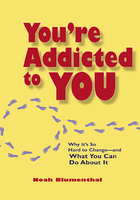
Preface
I wrote this book because too many people believe that change is a matter of willpower. They believe that if people want to make significant changes in their lives, those with greater willpower will be successful. Those who fail to change do so because they lack something internally. They just don’t have the drive or conviction to see their efforts through.
The truth is we are all capable of changing ourselves. The problem is we are constantly bombarded with recommendations on what to change, but never really taught how to make difficult changes. We are told what we should change by friends and family, bosses and coworkers, magazines and TV shows, but then we are left without guidance. Once we know what results we want, how do we go about ridding ourselves of the bad habits we have accumulated over the course of our lives, and how do we replace those old behaviors with the new, superior ones? This book will help you identify what change or changes you want to make in yourself, and then it will answer the question of “how?”
Early in my career I watched one of my employers send hundreds of managers off to leadership training. The participants raved that it was, “ a life-changing experience,” and spoke of the program in reverent tones. However, in the weeks and months following their return from the program, it was pretty clear that little or no change had taken place. They treated their staff the same way they did prior to the training. The same went for how they managed their work, talked about the business, responded to crises, and “led” their organization.
The company must have spent millions of dollars on this training effort and the participants claimed that it was worth every penny. Unfortunately, no one changed. I saw the same thing happen in my personal world. Friends wanted to change their work habits, how they ate or exercised, or how they communicated with their spouses. They had the best intentions and strong motivation, but they almost always failed to make good on their plans.
I don’t think these people lacked willpower or desire. I truly believe they all wanted to change and that they even knew what they wanted that change to be. They wanted to be thinner, healthier, more considerate of others, more diligent, or better leaders. They just didn’t have a process to guide them through their change. The only advice they received was, “try harder.”
This book gives you a concrete process with nine clear steps to help you make your change. It is born out of both my professional and educational experiences. As an executive coach, I have helped hundreds of corporate clients, business owners, salespeople, and various individuals make difficult changes. I’ve helped them make changes to their leadership style, the effectiveness of their communication and relationships, the control they have over their emotions, and many other areas. As an undergraduate student in psychology and then as a graduate student in organizational psychology, I studied personal change and resistance and learned how a clear and effective process can greatly improve an individual’s ability to change.
I have watched real people succeed and fail at change and I have studied the topic at length. The conclusion I have drawn is that people need a new model for understanding how to change themselves. I use the concept of self-addiction—that people are addicted to their own behaviors. Being addicted to your behaviors doesn’t make you a bad person. You may be an exceptional parent, spouse, manager, and/or leader, but even the best will sometimes struggle with change and improvement. We all have something we could change to make ourselves happier, more effective, and more fulfilled in life and in work.
Using the concept of addiction is not meant to equate the behavioral challenges I will discuss in this book with the hereditary, biological, and chemical challenges of drug or alcohol addictions. This book is not meant as a treatment for, nor in any way to make light of, those diseases. However, the concept of addiction is important because it puts personal change into a new context. This book honestly states how difficult change is and gives you a real path to create that change.